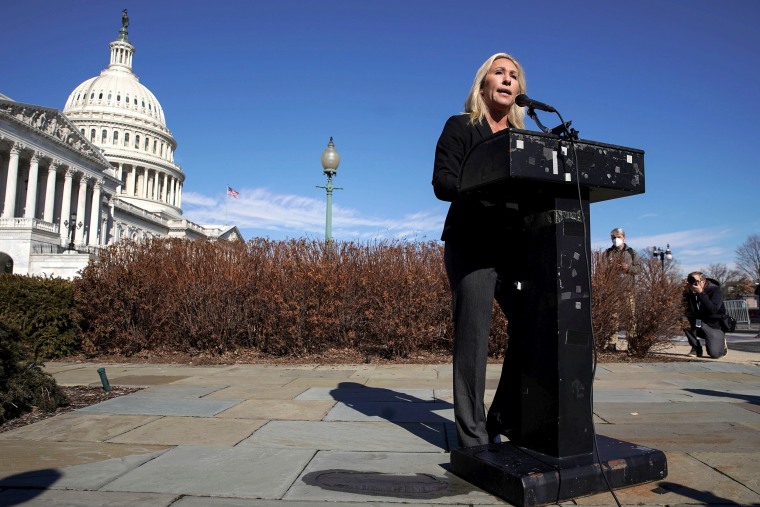It started with word from Rep. Marjorie Taylor Greene's (R-Ga.) communications director last week. "Be on the look out," the right-wing congresswoman's office said, "for a public release for the America First Caucus platform when it's released publicly very soon."
This was the first sign that at least one House Republican was involved with the creation of an America First Caucus -- apparently predicated on the idea that the Republican Study Group and the House Freedom Caucus weren't quite radical enough.
When the public finally saw the "platform" on Friday, it was stunning, even by 2021 standards. The unabashedly nativist document called for a "common respect for uniquely Anglo-Saxon political traditions." It added that immigrants risked undermining the nation's "unique identity."
It wasn't long before the initiative drew some oblique criticism from House Republican leaders, and even some of the GOP members reportedly involved in the project backpedaled. The Washington Post reported yesterday that the project now appears to be dead.
House Minority Whip Steve Scalise (R-La.) sought Tuesday to play down reports of fellow Republicans seeking to establish an "America First Caucus." ... "There is no caucus to do that," Scalise said at a news conference with other GOP leaders.
The Republican leader added, "[T]here is no member, there is no member of Congress who has said they're out there creating that kind of caucus."
Well, that appears to be true now, but it wasn't the case a few days ago. Not only was Greene's office involved in creating the "Anglo-Saxon" focused America First Caucus, but Rep. Louie Gohmert (R-Texas) told reporters late last week, "There is an America First Caucus."
That same day, after the nativist platform was already available online, Rep. Matt Gaetz (R-Fla.) published a tweet announcing that he was "proud to join" Greene in the America First Caucus.
In other words, while Scalise appeared eager yesterday to dismiss the very idea of House Republicans "creating that kind of caucus," it was literally just five days ago when the America First Caucus was formally taking shape. Greene also insisted this week that the "media" is to blame for picking up on "a fake story," but reality suggests otherwise.
To be sure, its demise is a welcome development. Indeed, I find it oddly reassuring that lines exist that House Republicans are uncomfortable crossing. (Note, for example, that Arizona's Paul Gosar, who was reportedly poised to be a founding member of the caucus, has been dogged by questions in recent months about his white-nationalist ties. GOP leaders have publicly ignored those questions.)
But as the dust settles, I'd love to hear more from leading Republicans about what, specifically, they didn't like about the America First Caucus' "platform."
The New Republic's Matt Ford, for example, argued this week that most of the caucus' policy stances "reflect the prevailing orthodoxy in Republican policy circles. Other positions may hold less support among some top GOP figures but still reflect the consensus of the Trumpian wing of the party."
From immigration to Big Tech, from trade to national security, from the pandemic to foreign aid, from climate change to infrastructure, "most of the caucus's platform is an attempt to distill high-test Trumpism into an ersatz legislative agenda," Ford added.
Slate's Ben Mathis-Lilley argued along the same lines, noting that America First Caucus' platform "reads like the latest installment of the five-years-and-counting project by conservative intellectuals to create a coherent Trump doctrine."
If House Republicans disapprove of the platform, I'm delighted. But by way of a follow-up, can they explain (a) whether they've read the document; and (b) which parts they disagree with?
